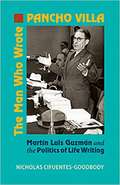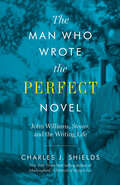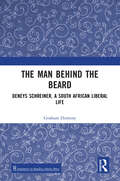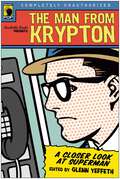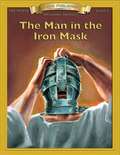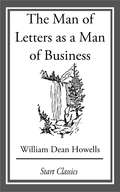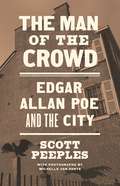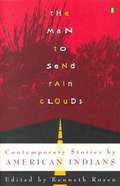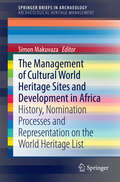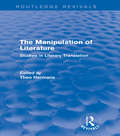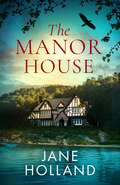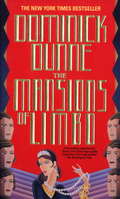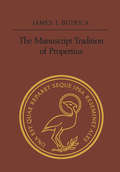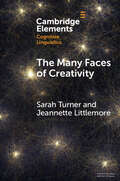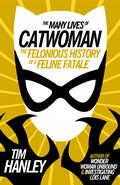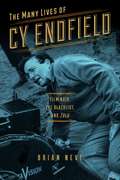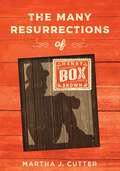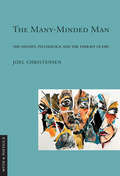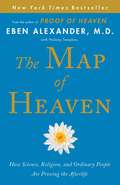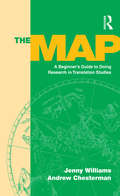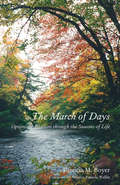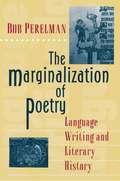- Table View
- List View
The Man Who Wrote Pancho Villa: Martin Luis Guzman and the Politics of Life Writing
by Nicholas Cifuentes-GoodbodyMartin Luis Guzman was many things throughout his career in twentieth-century Mexico: a soldier in Pancho Villa's revolutionary army, a journalist-in-exile, one of the most esteemed novelists and scholars of the revolutionary era, and an elder statesman and politician. In The Man Who Wrote Pancho Villa, we see the famous author as he really was: a careful craftsman of his own image and legacy. His five-volume biography of Villa propelled him to the heights of Mexican cultural life, and thus began his true life's work. Nicholas Cifuentes-Goodbody shapes this study of Guzman through the lens of "life writing" and uncovers a tireless effort by Guzman to shape his public image.The Man Who Wrote Pancho Villa places Guzman's work in a biographical context, shedding light on the immediate motivations behind his writing in a given moment and the subsequent ways in which he rewrote or repackaged the material. Despite his efforts to establish a definitive reading of his life and literature, Guzman was unable to control that interpretation as audiences became less tolerant of the glaring omissions in his self-portrait.
The Man Who Wrote the Perfect Novel: John Williams, Stoner, and the Writing Life
by Charles J. ShieldsAn &“engrossing&” biography of a brilliant novelist underappreciated in his own time who became a twenty-first-century bestseller, from the New York Times–bestselling author (The New Yorker). When Stoner was published in 1965, the novel sold only a couple of thousand copies before disappearing with hardly a trace. Yet the quietly powerful tale of Midwestern college professor William Stoner, whose life becomes a parable of solitude and anguish, eventually found an admiring audience in America and especially in Europe. The New York Times called Stoner &“a perfect novel,&” and a host of writers and critics, including Colum McCann, Julian Barnes, Bret Easton Ellis, Ian McEwan, Emma Straub, Ruth Rendell, C.P. Snow, and Irving Howe, praised its artistry. The New Yorker deemed it &“a masterly portrait of a truly virtuous and dedicated man.&” This biography traces the life of Stoner&’s author, John Williams. Charles J. Shields follows the whole arc of Williams&’s life, which in many ways paralleled that of his titular character, from their shared working-class backgrounds to their undistinguished careers in academia. Shields vividly recounts Williams&’s development as an author, whose other works include the novels Butcher&’s Crossing and Augustus (for the latter, Williams shared the 1972 National Book Award). Shields also reveals the astonishing afterlife of Stoner, which garnered new fans with each American reissue, and then became a bestseller all over Europe after a Dutch publisher brought out a translation in 2013. Since then, Stoner has been published in twenty-one countries and sold over a million copies. &“Like Williams, Shields know how to tell a good story, one that will appeal especially to those interested in the ins and outs of the publishing industry and the ups and downs of a writer&’s life.&” —Los Angeles Review of Books
The Man Who Wrote the Perfect Novel: John Williams, Stoner, and the Writing Life
by Charles J. ShieldsAn &“engrossing&” biography of a brilliant novelist underappreciated in his own time who became a twenty-first-century bestseller, from the New York Times–bestselling author (The New Yorker). When Stoner was published in 1965, the novel sold only a couple of thousand copies before disappearing with hardly a trace. Yet the quietly powerful tale of Midwestern college professor William Stoner, whose life becomes a parable of solitude and anguish, eventually found an admiring audience in America and especially in Europe. The New York Times called Stoner &“a perfect novel,&” and a host of writers and critics, including Colum McCann, Julian Barnes, Bret Easton Ellis, Ian McEwan, Emma Straub, Ruth Rendell, C.P. Snow, and Irving Howe, praised its artistry. The New Yorker deemed it &“a masterly portrait of a truly virtuous and dedicated man.&” This biography traces the life of Stoner&’s author, John Williams. Charles J. Shields follows the whole arc of Williams&’s life, which in many ways paralleled that of his titular character, from their shared working-class backgrounds to their undistinguished careers in academia. Shields vividly recounts Williams&’s development as an author, whose other works include the novels Butcher&’s Crossing and Augustus (for the latter, Williams shared the 1972 National Book Award). Shields also reveals the astonishing afterlife of Stoner, which garnered new fans with each American reissue, and then became a bestseller all over Europe after a Dutch publisher brought out a translation in 2013. Since then, Stoner has been published in twenty-one countries and sold over a million copies. &“Like Williams, Shields know how to tell a good story, one that will appeal especially to those interested in the ins and outs of the publishing industry and the ups and downs of a writer&’s life.&” —Los Angeles Review of Books
The Man behind the Beard: Deneys Schreiner, a South African Liberal Life
by Graham DominyDeneys Schreiner was an academic, a scientist and a man of strong liberal principles, with a good sense of humor and widespread interests in the sciences, arts and public affairs. In his steady way, he transformed the University of Natal and the community around it. Between the 1960s and 1980s, Schreiner supported and initiated several endeavors to promote constitutional futures other than those imposed by the apartheid government. One of the most significant was the Buthelezi Commission, which he chaired. This biography sets out the context of the times in which Schreiner lived and his life from his ancestors to his tenure as Vice-Principal. This book is created with extensive archival research, supported by interviews with family members, former colleagues, friends, and journalists. Schreiner was a man who made a considerable contribution to the struggle for democracy in South Africa. And then there is the story of his beard, once described as a potent symbol of his presence and implacable integrity. Print edition not for sale in Sub Saharan Africa.
The Man from Krypton: A Closer Look at Superman
by Glenn YeffethLeading writers discuss, debate, and celebrate the legend of Superman in this anthology, contending that his legend is a truly American myth. Superman was an immigrant with little more than the clothes on his back and raised by simple farmers, absorbing their humble values. He always chose to do the right thing, fighting for truth, justice, and the American way, and represents America at its best. The in-depth analyses of the comics, films and cartoons are at turns funny, philosophical, insightful, and personal, exploring every aspect of the Superman legend.
The Man in the Iron Mask
by Alexandre Dumas Robin M. AionaBring the Classics To Life. These novels have been adapted into 10 short chapters that will excite the reluctant reader as well as the enthusiastic one. Key words are defined and used in context. Multiple-choice questions require the student to recall specific details, sequence the events, draw inferences from story context, develop another name for the chapter, and choose the main idea.
The Man of Letters as a Man of Busine
by William Dean HowellsHe can say that, as the thing is, unless he sells his art he cannot live, that society will leave him to starve if he does not hit its fancy in a picture, or a poem, or a statue; and all this is bitterly true. He is, and he must be, only too glad if there is a market for his wares.
The Man of the Crowd: Edgar Allan Poe and the City
by Scott PeeplesHow four American cities shaped Poe's life and writingsEdgar Allan Poe (1809–1849) changed residences about once a year throughout his life. Driven by a desire for literary success and the pressures of supporting his family, Poe sought work in American magazines, living in the cities that produced them. Scott Peeples chronicles Poe's rootless life in the cities, neighborhoods, and rooms where he lived and worked, exploring how each new place left its enduring mark on the writer and his craft.Poe wrote short stories, poems, journalism, and editorials with urban readers in mind. He witnessed urban slavery up close, living and working within a few blocks of slave jails and auction houses in Richmond and among enslaved workers in Baltimore. In Philadelphia, he saw an expanding city struggling to contain its own violent propensities. At a time when suburbs were just beginning to offer an alternative to crowded city dwellings, he tried living cheaply on the then-rural Upper West Side of Manhattan, and later in what is now the Bronx. Poe's urban mysteries and claustrophobic tales of troubled minds and abused bodies reflect his experiences living among the soldiers, slaves, and immigrants of the American city.Featuring evocative photographs by Michelle Van Parys, The Man of the Crowd challenges the popular conception of Poe as an isolated artist living in a world of his own imagination, detached from his physical surroundings. The Poe who emerges here is a man whose outlook and career were shaped by the cities where he lived, longing for a stable home.
The Man to Send Rain Clouds: Contemporary Stories by American Indians
by Kenneth RosenThe stories in this collection--now updated with a new introduction--reflect the modern experience of white-educated Indians, bitterly aware that their culture is threatened with destruction, trying to bear witness through a non-Indian genre: the short story.
The Management Of Cultural World Heritage Sites and Development In Africa
by Simon MakuvazaEver since the signing of the World Heritage Convention 40 years ago and ratified by 33 African countries, to date, only 43 cultural heritage sites have been successfully proclaimed as World Heritage Sites in Africa. These include archaeological and historical sites, religious monuments and cultural landscapes This book is a re-evaluation of the nomination and management of cultural World Heritage sites in Africa from the late 1970s when the Island of Gorée of Senegal and the Rock-Hewn Churches of Ethiopia were first inscribed on the WHL until today It considers whether a credible and well balanced WHL has been attained, especially in regards to the nomination of more sites in Africa. The book also examines the roles and contribution of various heritage organizations and African governments to the nomination and management of cultural World Heritage sites in Africa. Lastly, the volume also scrutinizes economic development, which may result from the nomination and successful management of cultural World Heritage sites in Africa.
The Manipulation of Literature: Studies in Literary Translation (Routledge Revivals)
by Theo HermansFirst published in 1985, the essays in this edited collection offer a representative sample of the descriptive and systematic approach to the study of literary translation. The book is a reflection of the theoretical thinking and practical research carried out by an international group of scholars who share a common standpoint. They argue the need for a rigorous scientific approach the phenomena of translation – one of the most significant branches of Comparative Literature – and regard it as essential to link the study of particular translated texts with a broader methodological position. Considering both broadly theoretical topics and particular cases and traditions, this volume will appeal to a wide range of students and scholars across disciplines.
The Manor House
by Jane Holland'I absolutely love this book from start to finish...a really atmospheric read, and brilliant characters.' NetGalley Reader, *****1963. When Eleanor meets famous young poet, Lyndon Chance, he offers a way to flee her abusive father. In return, she must pretend to be Lyndon's wife. He takes her home to a Tudor manor on the Camel Estuary in Cornwall, where she finds herself in the middle of a feud between Lyndon and his twin brother, Oliver. It's soon clear that the old house hides many dark secrets. But could they be a threat to Eleanor?Now. Taylor has come to idyllic Cornwall to research for her Master's thesis, combining her love for conservation with a personal interest in Chance's poetry. Haunted by her own tragic past, Taylor finds Chance's notoriety fascinating. If only the poet's grandson, Julius, wasn't so determined to thwart her attempts to uncover his family secrets. As Eleanor realises she's out of her depth at Estuary House, drawn to Lyndon like a moth to a flame, Taylor and Julius must fight their own attraction - but could shadows from the past tear them all apart?A stunning and richly evocative timeslip, perfect for fans of Lucinda Riley, Santa Montefiore and Kate Morton.
The Manor House
by Jane Holland'I absolutely love this book from start to finish...a really atmospheric read, and brilliant characters.' NetGalley Reader, *****1963. When Eleanor meets famous young poet, Lyndon Chance, he offers a way to flee her abusive father. In return, she must pretend to be Lyndon's wife. He takes her home to a Tudor manor on the Camel Estuary in Cornwall, where she finds herself in the middle of a feud between Lyndon and his twin brother, Oliver. It's soon clear that the old house hides many dark secrets. But could they be a threat to Eleanor?Now. Taylor has come to idyllic Cornwall to research for her Master's thesis, combining her love for conservation with a personal interest in Chance's poetry. Haunted by her own tragic past, Taylor finds Chance's notoriety fascinating. If only the poet's grandson, Julius, wasn't so determined to thwart her attempts to uncover his family secrets. As Eleanor realises she's out of her depth at Estuary House, drawn to Lyndon like a moth to a flame, Taylor and Julius must fight their own attraction - but could shadows from the past tear them all apart?A stunning and richly evocative timeslip, perfect for fans of Lucinda Riley, Santa Montefiore and Kate Morton.
The Mansions of Limbo
by Dominick DunneIn a collection of his essays from Vanity Fair, the best-selling author reveals the life and times of the beautiful--and not-so-beautiful--people.
The Manuscript Tradition of Propertius
by The Estate of James ButricaThe elegist Sextus Propertius (ca 50-ca 16 BC) is generally reckoned among the most difficult of Latin authors. At the root of this difficulty lies a deeply corrupt text and uncertainty over the manuscript transmission; moreover, the manuscripts used in the standard editions of today have been selected without a comprehensive examination of the surviving copies. This study, the fullest survey of the manuscripts so far, considers the affiliation of more than 140 complete or partial witnesses and offers a thorough reassessment of the tradition. The principal novelty is the argument that six Renaissance copies represent an independent third witness to the archetype, revealing passages where corruptions, glosses, or medieval corrections are now accepted as the words of Propertius and suggesting that the archetype was far more corrupt than now commonly supposed. The study is in two parts. In Part One, after a survey of Propertius' fortuna in the Middle Ages, the author considers the affiliation and history of the known manuscripts and editions to 1502, then offers a text and revised apparatus of four elegies; in Part Two he presents detailed descriptions of 143 manuscripts, most of them from personal inspection.
The Many Faces of Creativity: Exploring Synaesthesia through a Metaphorical Lens (Elements in Cognitive Linguistics)
by Jeannette Littlemore Sarah TurnerCreative metaphor has been of central interest to the cognitive linguistic research community in recent years. However, little is known about what propels people to use metaphor in a creative way. In this Element, the authors identify and explore some of the clues that synaesthesia may provide to help us better understand the factors that drive creativity, with a particular focus on creative metaphor. They identify the factors that seem to trigger the production of creative metaphor in synaesthetes, and explore what this can tell us about creativity in the population more generally. Their findings provide insights into the nature of creativity as it relates to metaphor, emotion and embodied experience. They argue that the production of creative metaphor arises from strong affective reactions to sensory and emotional stimuli and that there is an embodied symbiotic relationship between sensory experiences, embodiment, emotion, hyperbole, empathy, metaphor and creativity.
The Many Lives of Catwoman: The Felonious History of a Feline Fatale
by Tim HanleyFor more than 75 years, Catwoman has forged her own path in a clear-cut world of stalwart heroes, diabolical villains and damsels in distress. Sometimes a thief, sometimes a vigilante, sometimes neither and sometimes both, the mercurial Catwoman gleefully defies classification. Her relentless independence across comic books, television and film appearances set her apart from the rest of the superhero world. When female characters were limited to little more than romantic roles, Catwoman used her feminine wiles to manipulate Batman and escape justice at every turn. When male villains dominated Gotham on the small screen, Catwoman entered the mix and outshone them all. When female-led comics were few and far between, Catwoman headlined her own series for over 20 years. True to her nature, Catwoman stole the show everywhere she appeared, regardless of the medium. But her unique path had its downsides as well. Her existence on the periphery of the superhero world made her expendable, and she was prone to lengthy absences. Her villainous origins also made her susceptible to sexualized and degrading depictions from her primarily male creators in ways that most conventional heroines didn't face. Exploring the many incarnations of this cultural icon offers a new perspective on the superhero genre and showcases the fierce resiliency that has made Catwoman a fan favorite for decades.
The Many Lives of Cy Endfield
by Brian NeveCy Endfield (1914-1995) was a filmmaker who was also fascinated by the worlds of close-up magic, science, and invention. After directing several distinctive low-budget films in Hollywood, he was blacklisted in 1951 and fled to Britain rather than "name names” before HUAC, the U. S. House of Representatives’ Un-American Activities Committee. The Pennsylvania-born Endfield made films that exhibit an outsider’s eye for his adopted country, including the working-class "trucking” drama Hell Drivers and the cult film Zulu--a war epic as politically nuanced as it is spectacular. Along the way he encountered Orson Welles, collaborated with pioneering animator Ray Harryhausen, published a book of his card magic, and co-invented an early word processor that anticipated today’s technology. The Many Lives of Cy Endfield is the first book on this fascinating figure. The fruit of years of archival research and personal interviews by Brian Neve, it documents Endfield’s many identities: among them second-generation immigrant, Jew, Communist, and exile. Neve paints detailed scenes not only of the political and personal dramas of the blacklist era, but also of the attempts by Hollywood directors in the postwar 1940s and early 1950s to address social and political controversies of the day. Out of these efforts came two crime melodramas (what would become known as film noir) on inequalities of class and race: The Underworld Story and The Sound of Fury (also known as Try and Get Me!). Neve reveals the complex production and reception histories of Endfield’s films, which the critic Jonathan Rosenbaum saw as reflective of "an uncommon intelligence so radically critical of the world we live in that it’s dangerous. ” The Many Lives of Cy Endfield is at once a revealing biography of an independent, protean figure, an insight into film industry struggles, and a sensitive and informed study of an underappreciated body of work.
The Many Resurrections of Henry Box Brown
by Martha CutterOn March 23, 1849, Henry Brown climbed into a large wooden postal crate and was mailed from slavery in Richmond, Virginia, to freedom in Philadelphia, Pennsylvania. “Box Brown,” as he came to be known after this astounding feat, went on to carve out a career as an abolitionist speaker, actor, magician, hypnotist, and even faith healer, traveling the United States, the United Kingdom, and Canada until his death in 1897.The Many Resurrections of Henry Box Brown is the first book to show how subversive performances were woven into Brown’s entire life, from his early days practicing magic in Virginia while enslaved, to his last shows in Canada and England in the 1890s. It recovers forgotten elements of Brown’s history to illustrate the ways he made himself a spectacle on abolitionist lecture circuits via outlandish performances, and then fell off these circuits and went on to reinvent himself again and again. Brown’s stunts included creating a moving panoramic picture show about his escape; parading through the streets dressed as a “Savage Indian” or “African Prince”; convincing hypnotized individuals that they were sheep who would gobble down raw cabbage; performing magic, dark séances, and ventriloquism; and even climbing back into his “original” box to jump out of it on stage.In this study, Martha J. Cutter analyzes contemporary resurrections of Brown’s persona by leading poets, writers, and visual artists. Both in Brown’s time and in ours, stories were created, invented, and embellished about Brown, continuing to recreate his intriguing, albeit fragmentary and elusive, story. The Many Resurrections of Henry Box Brown fosters a new understanding not only of Brown’s life but of modern Black performance art that provocatively dramatizes the unfinished work of African American freedom.
The Many-Headed Muse
by Pauline A. LevenThis is the first monograph entirely devoted to the corpus of late-classical Greek lyric poetry. Not only have the dithyrambs and kitharodic nomes of the New Musicians Timotheus and Philoxenus, the hymns of Aristotle and Ariphron, and the epigraphic paeans of Philodamus of Scarpheia and Isyllus of Epidaurus never been studied side by side, they have also remained hidden behind a series of critical prejudices - political, literary and aesthetic. Professor LeVen's book provides readings of these little-known poems and combines engagement with the style, narrative technique, poetics and reception of the texts with attention to the socio-cultural forces that shaped them. In examining the protean notions of tradition and innovation, the book contributes to the current reevaluation of the landscape of Greek poetry and performance in the late classical period and bridges a gap in our understanding of Greek literary history between the early classical and the Hellenistic periods.
The Many-Minded Man: The "Odyssey," Psychology, and the Therapy of Epic (Myth and Poetics II)
by Joel ChristensenIn The Many-Minded Man, Joel Christensen explores the content, character, and structure of the Homeric Odyssey through a modern psychological lens, focusing on how the epic both represents the workings of the human mind and provides for its audiences—both ancient and modern—a therapeutic model for coping with the exigencies of chance and fate.By reading the Odyssey as an exploration of the constitutive elements of human identity, the function of narrative in defining the self, and the interaction between the individual and their social context, The Many-Minded Man addresses enduring questions about the poem, such as the importance of Telemachus's role, why Odysseus must tell his own tale, and the epic's sudden and unexpected closure. Through these dynamics, Christensen reasons, the Odyssey not only instructs readers about how narrative shapes a sense of agency but also offers solutions for avoiding dangerous stories and destructive patterns of thought.
The Map of Heaven: How Science, Religion, and Ordinary People Are Proving the Afterlife
by Ptolemy Tompkins Eben AlexanderThe author of the #1 New York Times bestseller Proof of Heaven teams up with the sages of times past, modern scientists, and with ordinary people who have had profound spiritual experiences to show the reality of heaven and our true identities as spiritual beings.When Proof of Heaven was published, some readers contacted Dr. Eben Alexander to argue that his near-death experience was impossible. But many more have written to say his story resonated with them in profound ways. Thanks to them, Dr. Alexander came to realize that sharing his story has allowed people to rediscover what so many in ancient times knew: there is more to life--and to the universe--than this single earthly life. Dr. Alexander met and heard from thousands of individuals whom his story has affected. He, with coauthor Ptolemy Tompkins, also studied what the world's religious traditions, philosophers, and scientists have had to say about the soul's survival of death. He has been deeply surprised at how often those voices from the past sync up with what he hears from people today. In The Map of Heaven, he shares some of the stories that people have told him and links them to what the world's spiritual traditions and its latest scientific insights have to say about the journey of the soul. Part metaphysical and scientific detective story, part manual for living, The Map of Heaven explores humankind's spiritual history and the progression of modern science from its birth in the seventeenth century, showing how we forgot, and are now at last remembering, who we really are and what our destiny truly is.
The Map: A Beginner's Guide to Doing Research in Translation Studies
by Jenny Williams Andrew ChestermanThe Map is a practical guidebook introducing the basics of research in translation studies for students doing their first major research project in the field. Depending on where they are studying, this may be at advanced undergraduate (BA) or at postgraduate (MA/PHD) level. The book consists of ten chapters. Chapter 1 offers an overview of 12 research areas in translation studies in order to help students identify a topic and establish some of the current research questions relating to it. Chapter 2 is designed to assist students in planning their research project and covers topics such as refining the initial idea, determining the scope of the project, checking out resources, reading critically, keeping complete bibliographic records, and working with a supervisor. Chapters 3 to 7 provide some of the conceptual and methodological tools needed in this area of research, with detailed discussion of such topics as theoretical models of translation, types of research, asking questions, making claims, formulating hypotheses, establishing relations between variables, and selecting and analyzing data. Chapters 8 and 9 are about presenting one's research, in writing as well as orally. Finally, chapter 10 deals with some of the criteria commonly used in research assessment, especially in the assessment of theses. The authors provide detailed guidance on further reading throughout. This is an essential reference work for research students and lecturers involved in supervising research projects and degrees.
The March of Days: Optimistic Realism through the Seasons of Life
by Patricia M. BoyerAlthough Patricia M. Boyer won a scholarship to McMaster University with the highest mathematics marks in Ontario and graduated at age 19, literature and languages were her specialty. She first worked as a public librarian, next as a secondary school teacher, then as a newspaper editor. A community leader in arts and theatre, Patricia was devoted to human rights action in her local community and around the world, church work, drama, the education of children with disabilities, and music. Each week she wrote a newspaper column inspired by episodes in the world around her, both local and global. She rewarded readers through articles infused with learning from literature, astute sensibility to human psychology, and balanced insights on the tragedies and comedies of life’s passing parade. Patricia Boyer summed up her approach to life as "optimistic realism". This collection of the best of her celebrated columns, organized through the twelve months of the year or "the march of days", includes reflections on seasonal celebrations, changing atmospheres of nature, and calendar milestones in the human cycle. A number of these concise yet poignant writings will move many readers with nostalgia as they evoke the happy events and tragic developments of the Sixties and Seventies. All of them, however, convey the wisdom of a woman whose message of optimistic realism endures like a timeless guide to living a satisfying life in the real world today.
The Marginalization of Poetry: Language Writing and Literary History
by Bob PerelmanLanguage writing, the most controversial avant-garde movement in contemporary American poetry, appeals strongly to writers and readers interested in the politics of postmodernism and in iconoclastic poetic form. Drawing on materials from popular culture, avoiding the standard stylistic indications of poetic lyricism, and using nonsequential sentences are some of the ways in which language writers make poetry a more open and participatory process for the readers. Reading this kind of writing, however, may not come easily in a culture where poetry is treated as property of a special class. It is this barrier that Bob Perelman seeks to break down in this fascinating and comprehensive account of the language writing movement. A leading language writer himself, Perelman offers insights into the history of the movement and discusses the political and theoretical implications of the writing. He provides detailed readings of work by Lyn Hejinian, Ron Silliman, and Charles Bernstein, among many others, and compares it to a wide range of other contemporary and modern American poetry. A variety of issues are addressed in the following chapters: "The Marginalization of Poetry," "Language Writing and Literary History," "Here and Now on Paper," "Parataxis and Narrative: The New Sentence in Theory and Practice," "Write the Power," "Building a More Powerful Vocabulary: Bruce Andrews and the World (Trade Center)," "This Page Is My Page, This Page Is Your Page: Gender and Mapping," "An Alphabet of Literary Criticism," and "A False Account of Talking with Frank O'Hara and Roland Barthes in Philadelphia."
